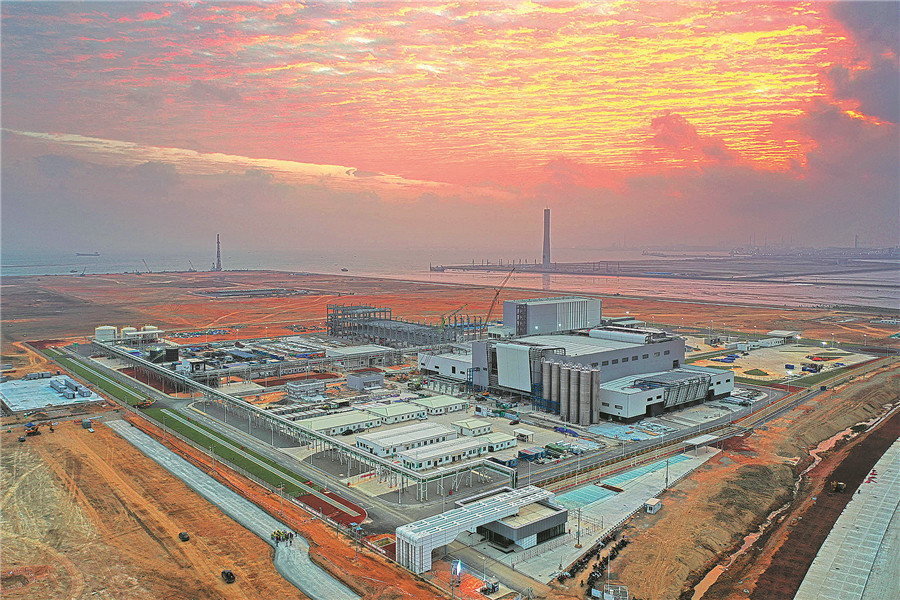Chinese, European leaders seek stable ties
China Daily, December 01, 2022 Adjust font size:

The BASF site under construction in Zhanjiang, Guangdong province, involves investment of $10 billion from the German chemical giant. [Photo/Xinhua]
Concerns voiced
Michael Spence, a Nobel laureate in economics, said European leaders are beginning to express discomfort with the US' approach to China.
"Concerns stem primarily from aggressive efforts to impede China's technological development," he wrote in an op-ed article for the international media organization Project Syndicate on Friday.
"Many fear that sweeping new restrictions on exports of advanced technology, software and equipment to China may mark a shift from broadly constructive strategic competition to a zero-sum approach," said Spence, the former dean of Stanford Graduate School of Business.
In October, Scholz resisted pressure from the partners in his three-way coalition government and reached a compromise in allowing Chinese shipping giant COSCO to buy a 24.9 percent stake in shipping company HHLA, which runs a terminal at Hamburg's port. The original deal would have allowed COSCO a 35 percent stake.
But Germany's Ministry of Economic Affairs, headed by Robert Habeck of the Greens party, announced early last month it was blocking the sale of Elmos Semiconductor, which is based in the German city of Dortmund, to Silex, a Swedish subsidiary of Chinese chip company Sai Microelectronics. In a statement, the ministry cited national security concerns, despite the fact that the acquisition deal was announced in December last year.
The German Foreign Ministry, headed by Annalena Baerbock, also from the Greens party, is reportedly circulating a 61-page draft copy of its China strategy.
The ministry urges German companies to diversify and reduce export dependency, adding that those "that are particularly exposed to China "should be obliged "to specify and summarize relevant China-related developments and figures" under their disclosure requirements.
According to a Reuters report, German business chiefs, including those from BASF, Deutsch Bank and Siemens, clashed in a meeting in September with the Ministry of Economic Affairs over its proposal to screen all company investment going into China.
Markus Jerger, head of the Mittelstand Association, which represents small and medium-sized German companies, attended the meeting. He said, "To put a break on the German economy's China activities, as the Ministry for Economic Affairs would like, or is trying to do, is the wrong way."
Beijing has rejected rhetoric that European states should cut their economic dependency on China and restrict Chinese investment in crucial infrastructure.
Foreign Ministry spokesman Zhao Lijian told a daily briefing on Monday that China is open to foreign investment in ports and telecommunications. He cited investment in a number of Chinese ports such as Shanghai, Tianjin, Dalian, Qingdao and Shenzhen by Danish shipping company Maersk. Zhao also said that as of June 2020, China had approved 266 telecom companies with foreign investment. "The so-called 'dependency on China' is a false narrative, because cooperation is mutually beneficial, and dependency is always mutual when it comes to business and trade," Zhao said.
Horst Lochel, an expert on China at the Frankfurt School of Finance &Management, warned against premature decisions regarding Chinese investors in Germany.
In a recent interview with German broadcaster DW, Lochel stressed that at least 5,000 German companies are operating in China and more than 2 million German jobs depend on exports to China. "The countries' economies are intertwined," he said, adding that overcritical views of China are hypocritical, as the German government is forging closer energy ties with countries in the Middle East with which it doesn't see eye-to-eye on political issues.
8a46e9c3-6d24-42e7-b434-7dae4449c837.jpeg)
